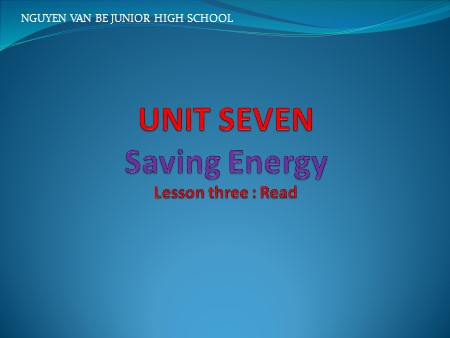Bài giảng Tiếng Anh Lớp 9 - Unit 7: Saving energy - Lesson 3: Read - Trường THCS Nguyễn Văn Bé
Bạn đang xem 20 trang mẫu của tài liệu "Bài giảng Tiếng Anh Lớp 9 - Unit 7: Saving energy - Lesson 3: Read - Trường THCS Nguyễn Văn Bé", để tải tài liệu gốc về máy hãy click vào nút Download ở trên.
Tóm tắt nội dung tài liệu: Bài giảng Tiếng Anh Lớp 9 - Unit 7: Saving energy - Lesson 3: Read - Trường THCS Nguyễn Văn Bé

NGUYEN VAN BE JUNIOR HIGH SCHOOL Complete the following sentences, using the words in the passage. (Hoàn thành các câu dưới đây sử dụng các từ có trong đoạn văn.) 1. Electricity, gas and water are not________luxuries but __________.necessities 2. Western consumers want products that___________not work only effectively _________savebut money. also 3. For most North American_______________,households lighting ________________ 10% to 15%accounts of the electricity for bill. 4. We can reduce the amount of electricity we use by___________ replacingan ordinary 100- watt light bulbs___________ energy-savingwith bulbs. 5. There is a labeling________scheme for electric equipment in Europe. 6. The___________label tells the consumers how much energy _____________ each modelefficiency has. 7. These_____________innovations will save money as well as _________ theconserve earth’s resources. 1. Energy-saving bulbs should be used to save electricity. 2. In Western countries, electricity, gas and water are necessities. 3. Northern American and European countries are interested in saving money and natural resources. 4. Labeling scheme help save energy. luxury – necessity – accounts for – bulb – conserve – efficiency – innovations – label – replace – scheme – category – ultimately (= finally) 1. There are sporty people and non-sporty people, and I'm definitely in the second___________________.category 2. We certainly don't lead a life of _____________________butluxury we're not poor either. 3. There are new laws to__________________________conserve wildlife in this area. 4. Sleep is an absolute ___________________________fornecessity life. 5. The room was lit only by a single 40-watt light___________________________.bulb 6. He's bought me a smart new camera to _________________________myreplace old one. 7. _____________________,Ultimately if the product is poor, the business will fail. 8. They are discussing a training ______________________forscheme unemployed teenagers. 9. New standards of energy ___________________________areefficiency being introduced. 10. Food accounts_____________________ for 30% of my salary. 11. This is one of the latest __________________ininnovations computer technology. 12. Washing instructions should be on the__________________________.label Fill in the blank with the correct form of the word in brackets. (Điền vào chổ trống với dạng đúng của từ cho trong ngoặc) 1. They have a very ________________house.luxurious (luxury) 2. We need to save money and cut out all ___________expenses.unnecessary (necessity) 3. I need to find a _______________forreplacement my sick secretary. (replace) 4. I think you should_____________innovate your new products. (innovation) 5. Energy ______________conservation reduces your fuel bills and helps the environment. (conserve) 6. She runs the business very_____________efficiently (efficiency). CONJUNCTION “AND” Conjunction “And” is used to join two words, phrases, parts of a sentence. It gives the meaning of “also, in addition to” liên từ “and” được dùng để liên kết 2 từ, 2 cụm từ, hoặc 2 mệnh đề với nhau. Nó cho ý nghĩa “bổ sung”. Từ tiếng việt tương đương là “và” EX: We were tired and hungry. I like reading books and listening to music Those days are gone and they'll never come again. CONJUNCTION “but” Conjunction “but” is used to introduce a word , a phrase or a clause that contrasts what was said before. (liên từ “but” được sử dụng để bắt đầu một từ, một cụm từ hoặc 1 mệnh đề mà nó có ý trái ngược với cái mới được nói đến). nó có nghĩa tương đương của tiếng việt là “nhưng, tuy nhiên” EX: We were tired but happy. Her mother won’t be there, but her father might CONJUNCTION “so” “so” is used to show result of sth (liên từ “so” được dùng để diển tả kết quả của 1 việc gì đó. Nó có nghĩa tương đương tiếng việt là “ vì thế, do đó” Adverb. Clause of result EX: My knee started hurting(mệnh so I đềstopped chỉ kết quả running., hậu quả) Adverb. Clause of reason (mệnh đề chỉ lý do) = Because my knees started hurting, I stopped running ADVERB “however” “however” is used to introduce a statement that contrasts with sth that has just been said. Trạng từ “however” được sử dụng để mở đầu 1 câu nói mà trái ngược hay tương phản với cái mà mới được nói. Trạng từ này có nghĩa gần với liên từ “but” và nghĩa tiếng việt tương đương là “tuy nhiên, mặc dù vậy” EX: Mary is rich. However, John is poor. => Mary is rich, but John is poor. Phrasal verb Phrasal verb: is a phrase which consists of a verb in combination with a preposition or adverb or both. It’s also called “two-word verb” or “three-word verb” Ex: turn off, go on, look after, look forward to “Phrasal verb” là một cụm từ mà nó bao gồm 1 động từ kết hợp với 1 giới từ hoặc 1 trạng từ hoặc cả hai. “Phrasal verb cũng được gọi là “động từ hai chữ” hoặc “động từ ba chữ” Complete the following sentences, using the correct form of the phrasal verbs below. (Hoàn thành các câu dưới đây, sử dụng dạng đúng của các phrasal verbs cho bên dưới) Look for – look after – look forward to – turn on – turn off go on – account for – turn up – turn down 1. Students___________________________account for the majority of our customers. 2. Please _______________________turn off the television before you leave the room. 3. Could you_______________________turn down the music? It’s too loud. 4. She was ______________________________seeinglooking forward to her grandchildren again. 5. Who is___________________________looking after the children while you are away? 6. We are ______________looking for someone with experience in taking care of children.
File đính kèm:
 bai_giang_tieng_anh_lop_9_unit_7_saving_energy_lesson_3_read.pptx
bai_giang_tieng_anh_lop_9_unit_7_saving_energy_lesson_3_read.pptx